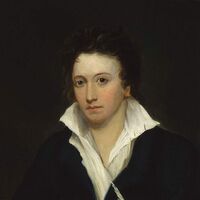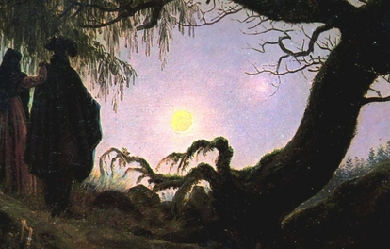Queen Mab: Part VII.
Spirit
‘I was an infant when my mother went
To see an atheist burned. She took me there.
The dark-robed priests were met around the pile;
The multitude was gazing silently;
And as the culprit passed with dauntless mien,
Tempered disdain in his unaltering eye,
Mixed with a quiet smile, shone calmly forth;
The thirsty fire crept round his manly limbs;
His resolute eyes were scorched to blindness soon;
His death-pang rent my heart! the insensate mob
Uttered a cry of triumph, and I wept.
’Weep not, child!' cried my mother, ‘for that man
Has said, There is no God.’
FAIRY
'There is no God!
Nature confirms the faith his death-groan sealed.
Let heaven and earth, let man’s revolving race,
His ceaseless generations, tell their tale;
Let every part depending on the chain
That links it to the whole, point to the hand
That grasps its term! Let every seed that falls
In silent eloquence unfold its store
Of argument; infinity within,
Infinity without, belie creation;
The exterminable spirit it contains
Is Nature’s only God; but human pride
Is skilful to invent most serious names
To hide its ignorance.
'The name of God
Has fenced about all crime with holiness,
Himself the creature of his worshippers,
Whose names and attributes and passions change,
Seeva, Buddh, Foh, Jehovah, God, or Lord,
Even with the human dupes who build his shrines,
Still serving o’er the war-polluted world
For desolation’s watchword; whether hosts
Stain his death-blushing chariot-wheels, as on
Triumphantly they roll, whilst Brahmins raise
A sacred hymn to mingle with the groans;
Or countless partners of his power divide
His tyranny to weakness; or the smoke
Of burning towns, the cries of female helplessness,
Unarmed old age, and youth, and infancy,
Horribly massacred, ascend to heaven
In honor of his name; or, last and worst,
Earth groans beneath religion’s iron age,
And priests dare babble of a God of peace,
Even whilst their hands are red with guiltless blood,
Murdering the while, uprooting every germ
Of truth, exterminating, spoiling all,
Making the earth a slaughter-house!
‘O Spirit! through the sense
By which thy inner nature was apprised
Of outward shows, vague dreams have rolled,
And varied reminiscences have waked
Tablets that never fade;
All things have been imprinted there,
The stars, the sea, the earth, the sky,
Even the unshapeliest lineaments
Of wild and fleeting visions
Have left a record there
To testify of earth.
’These are my empire, for to me is given
The wonders of the human world to keep,
And fancy’s thin creations to endow
With manner, being and reality;
Therefore a wondrous phantom from the dreams
Of human error’s dense and purblind faith
I will evoke, to meet thy questioning.
Ahasuerus, rise!'
A strange and woe-worn wight
Arose beside the battlement,
And stood unmoving there.
His inessential figure cast no shade
Upon the golden floor;
His port and mien bore mark of many years,
And chronicles of untold ancientness
Were legible within his beamless eye;
Yet his cheek bore the mark of youth;
Freshness and vigor knit his manly frame;
The wisdom of old age was mingled there
With youth’s primeval dauntlessness;
And inexpressible woe,
Chastened by fearless resignation, gave
An awful grace to his all-speaking brow.
SPIRIT
‘Is there a God?’
AHASUERUS
'Is there a God!-ay, an almighty God,
And vengeful as almighty! Once his voice
Was heard on earth; earth shuddered at the sound;
The fiery-visaged firmament expressed
Abhorrence, and the grave of Nature yawned
To swallow all the dauntless and the good
That dared to hurl defiance at his throne,
Girt as it was with power. None but slaves
Survived,-cold-blooded slaves, who did the work
Of tyrannous omnipotence; whose souls
No honest indignation ever urged
To elevated daring, to one deed
Which gross and sensual self did not pollute.
These slaves built temples for the omnipotent fiend,
Gorgeous and vast; the costly altars smoked
With human blood, and hideous pæans rung
Through all the long-drawn aisles. A murderer heard
His voice in Egypt, one whose gifts and arts
Had raised him to his eminence in power,
Accomplice of omnipotence in crime
And confidant of the all-knowing one.
These were Jehovah’s words.
'From an eternity of idleness
I, God, awoke; in seven days’ toil made earth
From nothing; rested, and created man;
I placed him in a paradise, and there
Planted the tree of evil, so that he
Might eat and perish, and my soul procure
Wherewith to sate its malice and to turn,
Even like a heartless conqueror of the earth,
All misery to my fame. The race of men,
Chosen to my honor, with impunity
May sate the lusts I planted in their heart.
Here I command thee hence to lead them on,
Until with hardened feet their conquering troops
Wade on the promised soil through woman’s blood,
And make my name be dreaded through the land.
Yet ever-burning flame and ceaseless woe
Shall be the doom of their eternal souls,
With every soul on this ungrateful earth,
Virtuous or vicious, weak or strong,-even all
Shall perish, to fulfil the blind revenge
(Which you, to men, call justice) of their God.'
'The murderer’s brow
Quivered with horror.
‘God omnipotent,
Is there no mercy? must our punishment
Be endless? will long ages roll away,
And see no term? Oh! wherefore hast thou made
In mockery and wrath this evil earth?
Mercy becomes the powerful-be but just!
O God! repent and save!’
'One way remains:
I will beget a son and he shall bear
The sins of all the world; he shall arise
In an unnoticed corner of the earth,
And there shall die upon a cross, and purge
The universal crime; so that the few
On whom my grace descends, those who are marked
As vessels to the honor of their God,
May credit this strange sacrifice and save
Their souls alive. Millions shall live and die,
Who ne’er shall call upon their Saviour’s name,
But, unredeemed, go to the gaping grave,
Thousands shall deem it an old woman’s tale,
Such as the nurses frighten babes withal;
These in a gulf of anguish and of flame
Shall curse their reprobation endlessly,
Yet tenfold pangs shall force them to avow,
Even on their beds of torment where they howl,
My honor and the justice of their doom.
What then avail their virtuous deeds, their thoughts
Of purity, with radiant genius bright
Or lit with human reason’s earthly ray?
Many are called, but few will I elect.
Do thou my bidding, Moses!'
'Even the murderer’s cheek
Was blanched with horror, and his quivering lips
Scarce faintly uttered-'O almighty one,
I tremble and obey!'
‘O Spirit! centuries have set their seal
On this heart of many wounds, and loaded brain,
Since the Incarnate came; humbly he came,
Veiling his horrible Godhead in the shape
Of man, scorned by the world, his name unheard
Save by the rabble of his native town,
Even as a parish demagogue. He led
The crowd; he taught them justice, truth and peace,
In semblance; but he lit within their souls
The quenchless flames of zeal, and blessed the sword
He brought on earth to satiate with the blood
Of truth and freedom his malignant soul
At length his mortal frame was led to death.
I stood beside him; on the torturing cross
No pain assailed his unterrestrial sense;
And yet he groaned. Indignantly I summed
The massacres and miseries which his name
Had sanctioned in my country, and I cried,
’Go! go!' in mockery.
A smile of godlike malice reillumined
His fading lineaments. ‘I go,’ he cried,
'But thou shalt wander o’er the unquiet earth
Eternally.' The dampness of the grave
Bathed my imperishable front. I fell,
And long lay tranced upon the charmèd soil.
When I awoke hell burned within my brain
Which staggered on its seat; for all around
The mouldering relics of my kindred lay,
Even as the Almighty’s ire arrested them,
And in their various attitudes of death
My murdered children’s mute and eyeless skulls
Glared ghastily upon me.
But my soul,
From sight and sense of the polluting woe
Of tyranny, had long learned to prefer
Hell’s freedom to the servitude of heaven.
Therefore I rose, and dauntlessly began
My lonely and unending pilgrimage,
Resolved to wage unweariable war
With my almighty tyrant and to hurl
Defiance at his impotence to harm
Beyond the curse I bore. The very hand,
That barred my passage to the peaceful grave,
Has crushed the earth to misery, and given
Its empire to the chosen of his slaves.
These I have seen, even from the earliest dawn
Of weak, unstable and precarious power,
Then preaching peace, as now they practise war;
So, when they turned but from the massacre
Of unoffending infidels to quench
Their thirst for ruin in the very blood
That flowed in their own veins, and pitiless zeal
Froze every human feeling as the wife
Sheathed in her husband’s heart the sacred steel,
Even whilst its hopes were dreaming of her love;
And friends to friends, brothers to brothers stood
Opposed in bloodiest battle-field, and war,
Scarce satiable by fate’s last death-draught, waged,
Drunk from the wine-press of the Almighty’s wrath;
Whilst the red cross, in mockery of peace,
Pointed to victory! When the fray was done,
No remnant of the exterminated faith
Survived to tell its ruin, but the flesh,
With putrid smoke poisoning the atmosphere,
That rotted on the half-extinguished pile.
'Yes! I have seen God’s worshippers unsheathe
The sword of his revenge, when grace descended,
Confirming all unnatural impulses,
To sanctify their desolating deeds;
And frantic priests waved the ill-omened cross
O’er the unhappy earth; then shone the sun
On showers of gore from the upflashing steel
Of safe assassination, and all crime
Made stingless by the spirits of the Lord,
And blood-red rainbows canopied the land.
'Spirit! no year of my eventful being
Has passed unstained by crime and misery,
Which flows from God’s own faith. I 've marked his slaves
With tongues, whose lies are venomous, beguile
The insensate mob, and, whilst one hand was red
With murder, feign to stretch the other out
For brotherhood and peace; and that they now
Babble of love and mercy, whilst their deeds
Are marked with all the narrowness and crime
That freedom’s young arm dare not yet chastise,
Reason may claim our gratitude, who now,
Establishing the imperishable throne
Of truth and stubborn virtue, maketh vain
The unprevailing malice of my foe,
Whose bootless rage heaps torments for the brave,
Adds impotent eternities to pain,
Whilst keenest disappointment racks his breast
To see the smiles of peace around them play,
To frustrate or to sanctify their doom.
'Thus have I stood,-through a wild waste of years
Struggling with whirlwinds of mad agony,
Yet peaceful, and serene, and self-enshrined,
Mocking my powerless tyrant’s horrible curse
With stubborn and unalterable will,
Even as a giant oak, which heaven’s fierce flame
Had scathèd in the wilderness, to stand
A monument of fadeless ruin there;
Yet peacefully and movelessly it braves
The midnight conflict of the wintry storm,
As in the sunlight’s calm it spreads
Its worn and withered arms on high
To meet the quiet of a summer’s noon.'
The Fairy waved her wand;
Ahasuerus fled
Fast as the shapes of mingled shade and mist,
That lurk in the glens of a twilight grove,
Flee from the morning beam;-
The matter of which dreams are made
Not more endowed with actual life
Than this phantasmal portraiture
Of wandering human thought.


